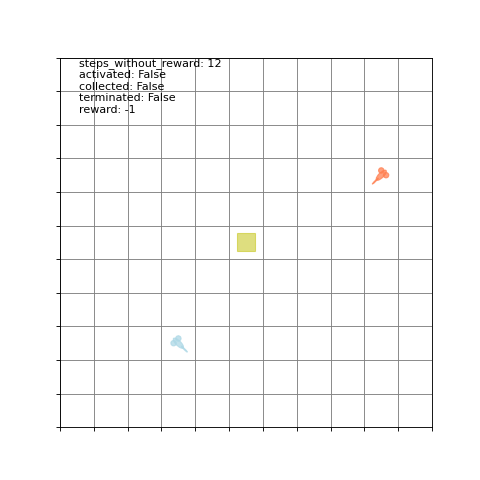marlax.agents.QValueAgent#
- class marlax.agents.QValueAgent(init_position=None, actions=['stay', 'up', 'down', 'left', 'right'])[source]#
Bases:
AgentAgent that selects actions based on scalar Q-values per global state.
- position#
Agent’s (x, y) position in the grid.
- Type:
tuple
- actions#
Available actions.
- Type:
list of str
- q_table#
Maps state_key to a scalar Q-value.
- Type:
defaultdict
- action_map#
Maps (dx, dy) offsets to action names.
- Type:
dict
- __init__(init_position=None, actions=['stay', 'up', 'down', 'left', 'right'])[source]#
Initialize agent with starting position and possible actions.
- Parameters:
init_position (tuple, optional) – The (x, y) starting coordinates. Defaults to None.
actions (list of str, optional) – Available actions. Defaults to [‘stay’, ‘up’, ‘down’, ‘left’, ‘right’].
Methods
__init__([init_position, actions])Initialize agent with starting position and possible actions.
choose(possible_states[, epsilon, agent_id])Select an action with epsilon-greedy exploration.
get_max_state(possible_states)Identify the state with the highest scalar Q-value.
update(state_key, action, reward, next_state_key)Update the scalar Q-value for a state using a simple update rule.
- choose(possible_states, epsilon=0.1, agent_id=0)[source]#
Select an action with epsilon-greedy exploration.
- Parameters:
possible_states (list) – List of global state keys to evaluate.
epsilon (float) – Exploration probability. Defaults to 0.1.
agent_id (int) – Identifier for this agent. Defaults to 0.
- Returns:
The action corresponding to the move towards the best state.
- Return type:
str
- get_max_state(possible_states)[source]#
Identify the state with the highest scalar Q-value.
- Parameters:
possible_states (list) – List of global state keys.
- Returns:
The state_key with the maximal Q-value.
- Return type:
any
- update(state_key, action, reward, next_state_key, alpha=0.1, gamma=0.99)[source]#
Update the scalar Q-value for a state using a simple update rule.
\[Q(s) <- (1-alpha)*Q(s) + alpha*(reward + gamma*Q(s'))\]where: - \(Q(s)\) is the current Q-value for the state, - \(Q(s')\) is the Q-value for the next state, - \(alpha\) is the learning rate, - \(gamma\) is the discount factor.
- Parameters:
state_key (any) – Current global state key.
action (str) – Action taken (unused since value is state-based).
reward (float) – Reward received after action.
next_state_key (any) – Next global state key.
alpha (float) – Learning rate. Defaults to 0.1.
gamma (float) – Discount factor. Defaults to 0.99.
